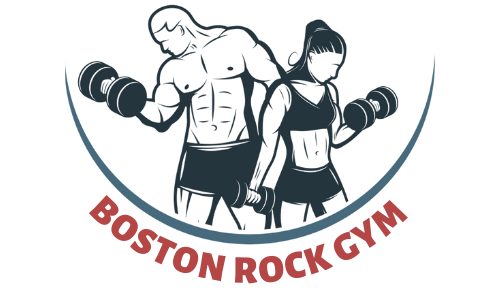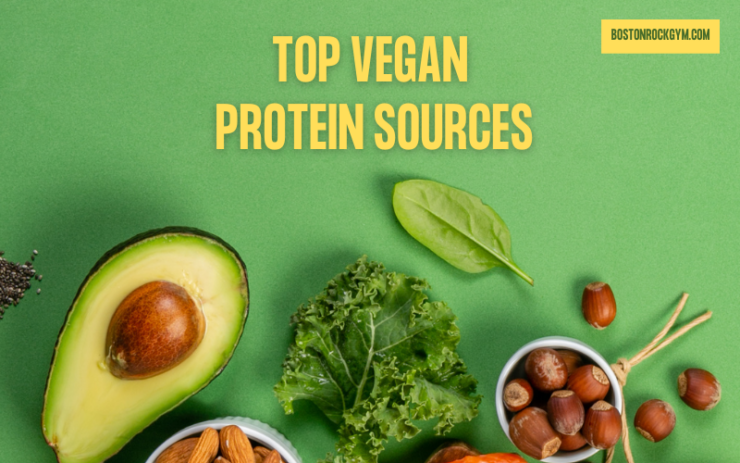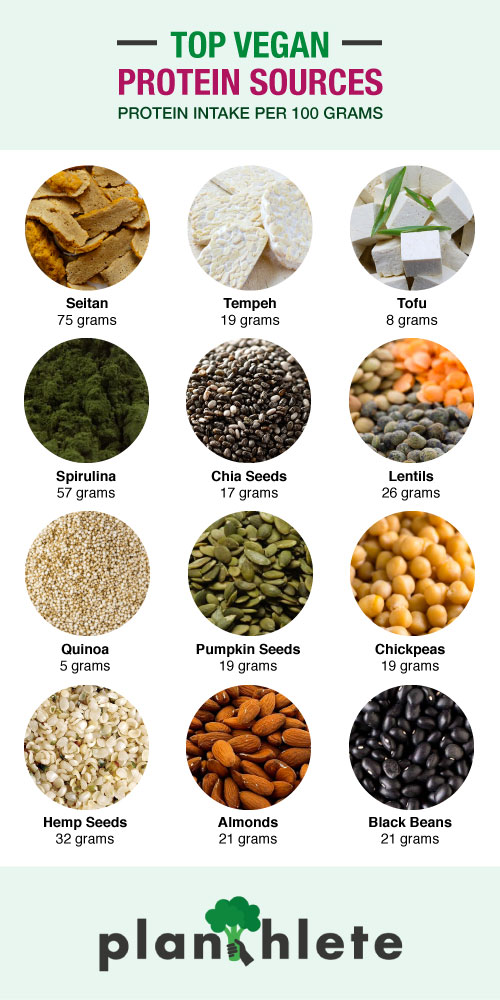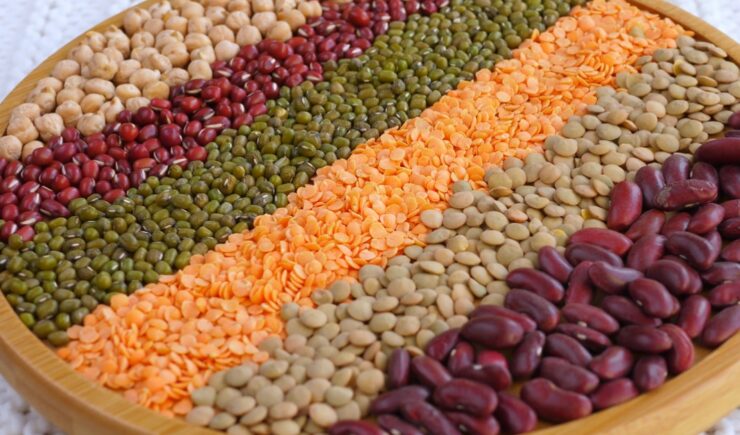Protein is an essential part of anyone’s diet. A lot of vegans think they lack protein in their diet. While meat and eggs are the most famous protein sources, there are a lot of vegan options as well that make a great protein source.
Contents
Why do we need protein?
Protein makes up the essential building blocks of our organs, skin, hormones, and muscles in your body. That’s why we should all eat high-quality protein at every meal. Different studies have found that eating high-quality protein at every meal improves health in various ways, such as helping you lose weight and fat while increasing your muscle mass and strength. A high protein diet also helps lowering blood pressure, fight diabetes and more.
How much protein should I eat?
How much protein you should eat is dependent on your body mass. The DRI (Dietary Reference Intake) is 0.8 grams of protein per kilogram of your body weight (or 0.36 grams per pound). So if you’re the average sedentary man you should have 56 grams of protein per day.
And if you’re an average sedentary woman, it should be 46. While this amount seems not like a lot, it is enough to prevent a deficiency. However, many health and fitness experts believe that we need more than that in order to function optimally. For example, endurance athletes need more significant amounts of protein about 1.2–1.4 grams per kg (0.5–0.65 grams per pound).
Can you get enough protein as a plant-based athlete?
Being vegan can have its challenges for Planthletes, as it is important to ensure there is plenty of energy and protein, omega-3 fatty acids as well as some key nutrients such as vitamin B12, zinc, and iron, as well as calorie intake. Studies show that a vegan diet can be more difficult to maintain, but with the right management and mind, a vegan diet can achieve the needs of most athletes satisfactorily.
Can you eat too much protein?
There are supposed to be many dangers if you eat a lot of protein. Some say that a high protein intake can reduce the calcium in your bones, cause osteoporosis or even destroy your kidneys. It is true that extremely high protein intake is unhealthy, but it is unclear at what intake level protein becomes harmful. It likely depends on the individual.
However, there is no evidence yet that eating lots of protein causes osteoporosis or reduces the calcium in your bones, studies show that it even leads to improved bone health.
High protein vegan food sources
To create an easy overview of all the best high-protein vegan sources we created this infographic. Below we further explain the other benefits of the foods.
1. Seitan – 75 grams of protein
Seitan, or wheat gluten, is a food made from gluten, the main protein of wheat. It is made by washing a ball of wheat flour dough with normal water until all the starch granules have been removed and have left the sticky insoluble gluten as an elastic mass which then can be cooked before being eaten. It tastes great and contains a lot of protein, 75 grams!
2. Tempeh – 19 grams of protein
Tempeh is made out of soy. It is a traditionally made food originating from Indonesia. Tempeh is high in protein, and has a lot of probiotics and contains a wide array of vitamins and minerals. Tempeh is a very versatile ingredient that comes with a large variety of all kinds of health benefits.
3. Tofu – 8 grams of protein
Next, to tempeh, Tofu is also known to be made out of soy. It is prepared by coagulating soy milk and pressing the resulting curds into soft white blocks. Tofu is wide-variable and the most popular meat replacement by vegans. Tofu is a great source of protein and contains all nine essential amino acids. It is also a great source of iron and calcium, it also contains the minerals manganese, selenium and phosphorous.
4. Spirulina – 57 grams of protein
Spirulina is a blue-green alga that comes from the sea. It’s extremely high in nutrients, but one of its most notable qualities is found in its protein content. It contains 60% of protein. The combination makes spirulina among the world’s most popular supplements. However, it is not easy to prepare a meal with spirulina. Though, it is used in smoothies and burgers.
5. Chia Seeds – 17 grams of protein
Just one tablespoon of chia seeds will provide almost 2g of protein, and they are the definition of versatile. They can be sprinkled over salads and soups, used in breakfasts, or as a protein-rich dessert. I also throw them in my vegan protein smoothies, for quick addition of protein. They are also packed with a lot of healthy Omega-3 fats.
6. Lentils – 26 grams of protein
Lentils are high in protein, fiber, folate, and manganese. They are an easy-to-prepare, versatile and nutritious mini version of a bean. They grow in pods and come in red, brown, black and green. You can make lentil soups, stews or add them to any meal as an extra protein source.
7. Quinoa – 5 grams of protein
Quinoa is one of the most popular health foods, think of all the quinoa salads and stir-fries you see nowadays. It is gluten-free and high in protein. Next to Tofu is one of the few plant foods that contain all nine essential amino acids. It is also high in fiber, magnesium, potassium, calcium, iron, and vitamins B and E.
8. Pumpkin Seeds – 19 grams of protein
Pumpkin seeds are small but are packed with all kinds of valuable nutrients. They contain a lot of healthy fats, magnesium, and zinc. It’s a great snack or you can use them in baking or smoothies.
9. Chickpeas – 19 grams of protein
10. Hemp Seeds – 32 grams of protein
Hemp seeds are high in protein, one tablespoon contains 3 grams of protein. It’s easy to mix in your high-protein vegan smoothies or use them as toppings for breakfasts, salads or baking goods. Hemp seeds contain over 30 percent of fat. They are rich in two essential fatty acids, omega-6 and omega-3.
11. Almonds – 21 grams of protein
Almonds are maybe one of the world’s most popular nuts, not only do they taste amazing. They also are highly nutritious and are packed with healthy fats, antioxidants, minerals, and vitamins.
12. Black Beans – 21 grams of protein
Beans, the black bean is maybe the best bean you can get. It’s a great source of fiber and protein. They are a staple food in Central and South America. Black beans are effective at reducing the rise in your blood sugar after a meal compared to other high-carb foods, for example, bread or rice.
References:
https://www.healthline.com/nutrition/protein-for-vegans-vegetarians
https://www.medicalnewstoday.com/articles/321474
https://www.bbcgoodfood.com/howto/guide/best-sources-protein-vegans





